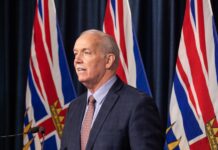WITH seven matches to be played in Vancouver during the FIFA World Cup 26 tournament, the Province, the City of Vancouver and BC Pavilion Corporation (PavCo) have updated their estimates of the costs, revenues and economic benefits for the world’s largest single sporting event.
“Marquee sporting events like the FIFA World Cup 26 have the power to inspire people to get involved in sport, amplify community spirit and put a spotlight on our incredible province,” said Lana Popham, Minister of Tourism, Arts, Culture and Sport, on Tuesday. “We are excited to welcome hundreds of thousands of visitors to Vancouver and British Columbia during the World Cup to celebrate this once-in-a-lifetime opportunity with us, boost our tourism sector and economy and help secure lasting benefits for the people of B.C.”
The gross core cost for FIFA World Cup 26 in Vancouver is estimated to be between $483 million and $581 million. These gross costs are expected to be offset by $383 million to $436 million in estimated revenues and recoveries, including:
* $116 million in direct financial contribution from the federal government;
* $230 million in estimated revenue from the additional major events municipal and regional district tax introduced in the City of Vancouver in February 2023; and
* $37 million to $90 million in anticipated revenue from other sources, such as facility rental fees and the FIFA commercial revenue program, which includes revenue opportunities at the FIFA fan festival, and opportunities for host city supporters and donors, and other provincial revenue.
After taking into account estimated revenues and recoveries, the Province estimates the net core cost of seven FIFA World Cup 26 matches to be $100 million to $145 million. This does not take into account potential additional provincial tax revenues as identified in the Province’s updated estimates of economic impact benefits, which are projected to be $224 million.
“The Government of Canada is proud to contribute close to $116 million to the 2026 FIFA Men’s World Cup in Vancouver, B.C. This event will showcase the hospitality, cultural diversity and landscape of British Columbia, while generating significant economic impact for communities across the province,” said Carla Qualtrough, federal Minister of Sport and Physical Activity. “Canadians are excited to cheer on Team Canada here at home. We are also excited to welcome the world to Vancouver in 2026!”
With Vancouver now confirmed to host seven matches, the economic benefits of hosting are estimated to include more than one million out-of-province visitors between 2026 and 2031, generating more than $1 billion in additional visitor spending and potentially up to $224 million in direct, indirect and other related provincial tax revenues.
The Province is committed to maximizing the social and economic impacts of these matches and will work to ensure people in all regions of the province share in the benefits.
“In just two short years, Vancouver will welcome the biggest event in the world,” said Ken Sim, Mayor of Vancouver. “Hosting FIFA World Cup 26 Vancouver will boost Vancouver’s hospitality and entertainment industries, transform our city and make us a world-class destination for tourism and major event hosting for decades to come.”
The Province, in partnership with the City of Vancouver, continues to take action toward true and lasting reconciliation. This includes working closely with the Musqueam, Squamish and Tsleil-Waututh Nations on the delivery of the tournament and its associated activities.
“Soccer is an important sport to Musqueam and we know that this tournament will inspire a new generation of Musqueam soccer players and fans alike,” said Chief Wayne Sparrow, Musqueam Nation. “We look forward to welcoming the world to our Coast Salish lands and contributing to this successful event that has the power to lift people up and bring people together.”
Sxwíxwtn Wilson Williams, spokesperson, Squamish First Nation, said: “The Squamish Nation is looking forward to working with our partners to host the world when the FIFA World Cup kicks off on our shared traditional territories in 2026. We are excited that this global event has the potential to benefit all of our collective communities and we look forward to the lasting positive legacies that will come from this tournament.”
Chief Jen Thomas of Tsleil-Waututh Nation, said: “We believe in the power of sport and how it can inspire and lift up all of our people. In the spirit of true reconciliation, the Tsleil-Waututh Nation looks forward to working closely with its partners to realize the great potential this event has for all of our people, our lands, and our communities.”
Investments in renovations and improvements to BC Place will improve accessibility and help the stadium remain modern and competitive on the global stage for years to come to continue to attract the world’s best sports, music and events.
More than 3.5 billion people watch the FIFA World Cup every four years.
Learn More:
To learn more about Vancouver, host city for FIFA World Cup 26, visit:
https://vancouverfwc26.ca/
For provincial cost, revenue, economic benefit estimates for FIFA World Cup 26, visit:
https://news.gov.bc.ca/files/
For City of Vancouver cost estimate for FIFA World Cup 26, visit:
https://news.gov.bc.ca/files/
For the July 2023 Vancouver FIFA World Cup 26 Economic Impact Assessment, visit: https://www2.gov.bc.ca/assets/
For the March 2024 Vancouver FIFA World Cup 26 Economic Impact Assessment, visit:
https://www2.gov.bc.ca/assets/














